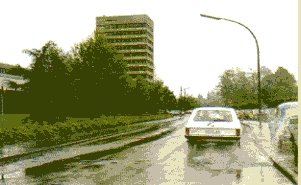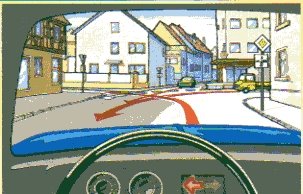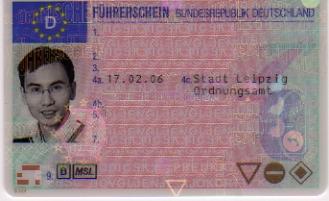Nathan has had some fun (stress actually - it's hard to convey sarcasm in text) over the past few months getting his German driving licence. Unfortunately, if you are staying in Germany for more than 1 year, you can only use your Australian driving licence for the first 6 months.
What's involved? First a theoretical test, which is actually quite difficult. The reason is NOT that you have to take the test in German - it's translated into English. What makes it difficult is that although it is multiple choice, it is possible for 1, 2 or 3 of the possible answers to be right, and some of the questions are quite obscure.
Do you think you could pass? Here's a sampling for you. Answers below.
Q1 (4 points) What are the possible effects of hashish consumption?
a) Diminished awareness of danger
b) Increased likelihood of mistakes in assimilating information.
c) Misjudgement of speed and distance.
Q2 (4 points) A faster car overtakes you on a country road and cuts into your lane. How to you react?
a) You sound your horn and flash your headlights to point out to the other driver that he has behaved wrongly. This, at the same time, works off your anger.
b) You feel challenged and start overtaking.
c) You control your annoyance, remain cool and proceed as if you had not noticed this.

Q3 (4 points) - Why is it necessary to maintain a particularly great safe distance from vehicles in front?
a) Because otherwise wheel-spray impairs visibility. b) Because the stopping distance is greater than on a dry road.
c) Because otherwise you might react too late to puddles.

Q4 (5 points) - Which conduct is correct?
a) I must allow the yellow truck to pass.
b) I must allow the green car to proceed.
c) I may turn in front of the green car.
Q5 (4 points) - What is the maximum number of persons an employer may allow to be taken to work on the floor of a truck?
[You must provide the number].
Q6 (4 points) Your vehicle loses oil. How much drinking water can be polluted by a single drop of oil? Up to:
a) 50 litres
b) 1 litre
c) 600 litres.
Answers
Q1) A typical drug question. These are generally pretty easy. Answer - a, b and c.
Q2) A typical road rage question. Also usually easy. Answer - c.
Q3) A typical "filter out idiots" question. These questions are usually common sense, but require you to understand the attitude of the examiners. Is reacting too late to puddles a legitimate concern, or are they trying to trick you? They are quite conservative. Answer - a, b and c.
Q4) Right of way in Germany is much more complicated than Australia. One of the more difficult rules is when a priority road turns a corner. The general rules are: a) If you stay on the priority road you have right of way. b) If you are on a priority road and you turn off, you have right of way except for rule a. c) Give way to the right except for the previous rules. Answer - a and c.
Q5) There are lots of questions regarding trucks and trailers, since the standard licence allows you to pull trailers and drive up to 3.5 tonne trucks. These are generally the hardest questions. This one in particular is tricky. Did you answer "zero"? Of course you did, and of course you are wrong. The answer is 8. Crazy Germans!
Q6) Environmental driving - a big thing in Germany, where the Green party was part of the ruling coalition for many years. Some would argue that a country where you can drive at unlimited speed on the autobahn would do much more for the environment by introducing a speed limit than by trying and get its learners to change gears early, accellerate slowly and turn off your engine when waiting at a railway crossing. This particular question is one of the harder ones of this type, and the somewhat surprising answer is c.
Scoring. The standard test has 30 questions. If you get a question wrong by choosing any incorrect answer or missing any correct answer, you lose ALL the points allocated to that question. If you lose more than 10 points over the whole test, you fail. Since there were only 6 questions on this mini-test, if you got even one question wrong, then you are likely to have failed the full test.
Not surpringly, when Nathan took his theoretical test (it takes place under exam conditions with all the hopefuls taking the same exam simultaneously), over half of the applicants (mostly eager but underprepared 17 year olds) failed.
Part 2 is a practical test, where you have to show the following:
1) Environmentally aware driving (change gears so that revs never go abouve 2000 rpm).
2) Look out for cyclist whenever turning.
3) Demonstrate correct speed limits (going too slow is almost as bad as going too fast).
4) Demonstrate knowledge of right of way (if you have right of way, and you check for other cars, you lose points!).
After the test (which was carried out in German), Nathan had a tense wait to find out if he passed or not. The examiner and the driving instructor (both are present during the test, however the instructor is not allowed to talk during the test) talked at length about all the mistakes he had made, before passing him. Afterwards, the driving instructor said he was very lucky to pass, and really should have failed!

And the result? Here it is. Note the pose for the photograph - a "half profile", rather than the standard "front on" passport photo.
 Owen, of course, has two teams to cheer for. His country of birth, and his country of citizenship. Unfortunately it's really hard to find an australian outfit of ANY size in Leipzig, let along for a 7 month old. Not a problem for the German games, as you can see in the photo. This is Owen cheering the Australia Brazil game with one of our fellow aussies. Wouldn't it be great if Owen was cheering an Australian German world cup final?!? But who would he barrack for?? We're not losing any sleep pondering this problem, don't worry!
Owen, of course, has two teams to cheer for. His country of birth, and his country of citizenship. Unfortunately it's really hard to find an australian outfit of ANY size in Leipzig, let along for a 7 month old. Not a problem for the German games, as you can see in the photo. This is Owen cheering the Australia Brazil game with one of our fellow aussies. Wouldn't it be great if Owen was cheering an Australian German world cup final?!? But who would he barrack for?? We're not losing any sleep pondering this problem, don't worry! Here's Owen practicing his soccer skills so he can try out for a future aussie team. Or will he try and play for the Germans?
Here's Owen practicing his soccer skills so he can try out for a future aussie team. Or will he try and play for the Germans? It's been quite busy in Leipzig. On Saturday was a big match between Germany and Sweden- not in Leipzig, but you can see from this photo that the big screen area was really packed. They closed the main ring road around the city because the spectators were spilling onto it, trying to get a vantage point of the screen.
It's been quite busy in Leipzig. On Saturday was a big match between Germany and Sweden- not in Leipzig, but you can see from this photo that the big screen area was really packed. They closed the main ring road around the city because the spectators were spilling onto it, trying to get a vantage point of the screen.
 The match between Argentinia and Mexico was in Leipzig, and there were lots of fans in the streets. The mexicans were more interesting with their huge hats and outfits. There were also lots of unlucky fans carrying signs "I Need Tickets". Can't show you a photo though - they were a bit camera shy. Not sure why though...
The match between Argentinia and Mexico was in Leipzig, and there were lots of fans in the streets. The mexicans were more interesting with their huge hats and outfits. There were also lots of unlucky fans carrying signs "I Need Tickets". Can't show you a photo though - they were a bit camera shy. Not sure why though... What is it with the weather and our time in Germany? Nathan was on his way home from work when it started hailing. It didn't seem so bad, until he received an SMS. "Both skylights have smashed".
What is it with the weather and our time in Germany? Nathan was on his way home from work when it started hailing. It didn't seem so bad, until he received an SMS. "Both skylights have smashed".
















